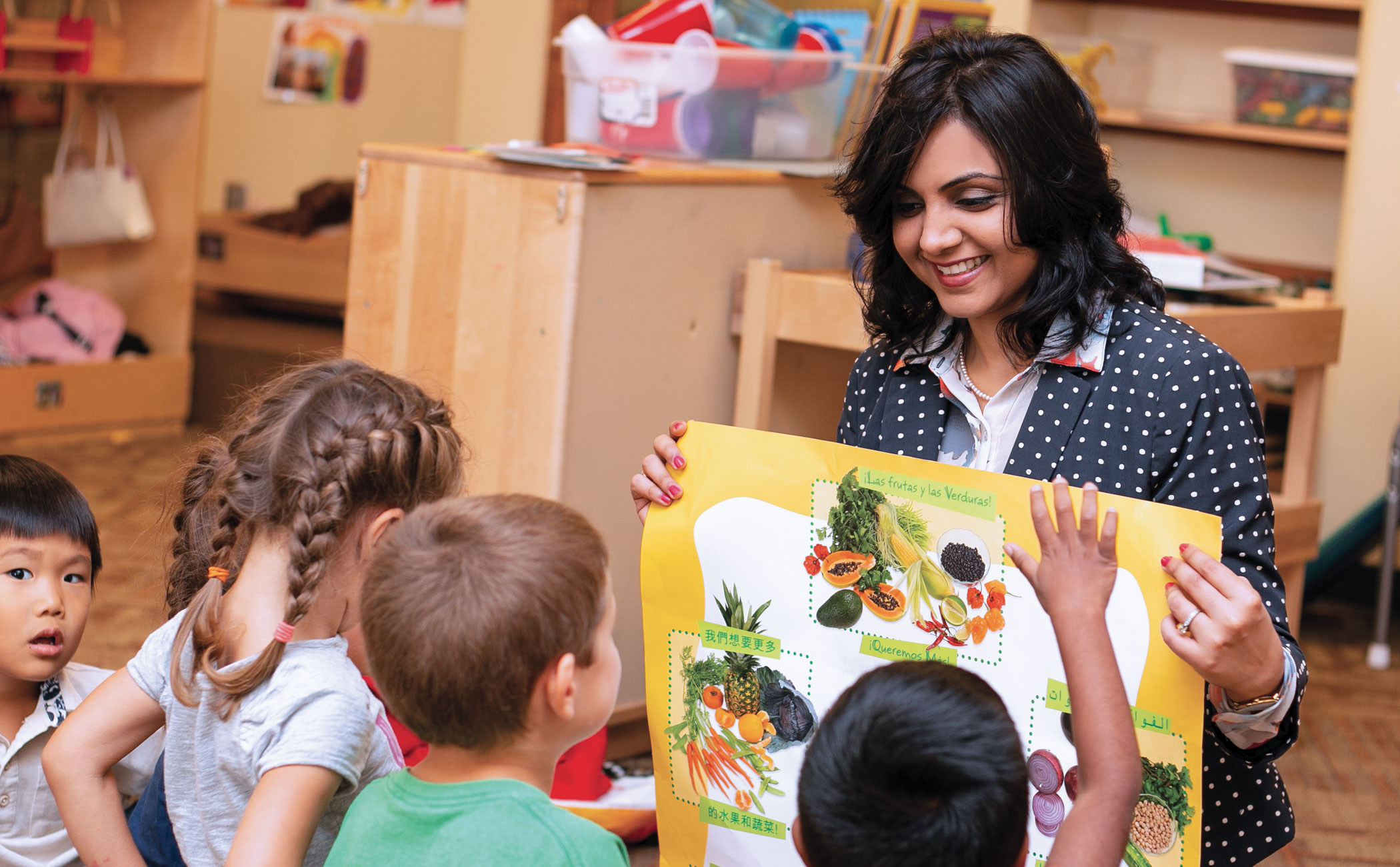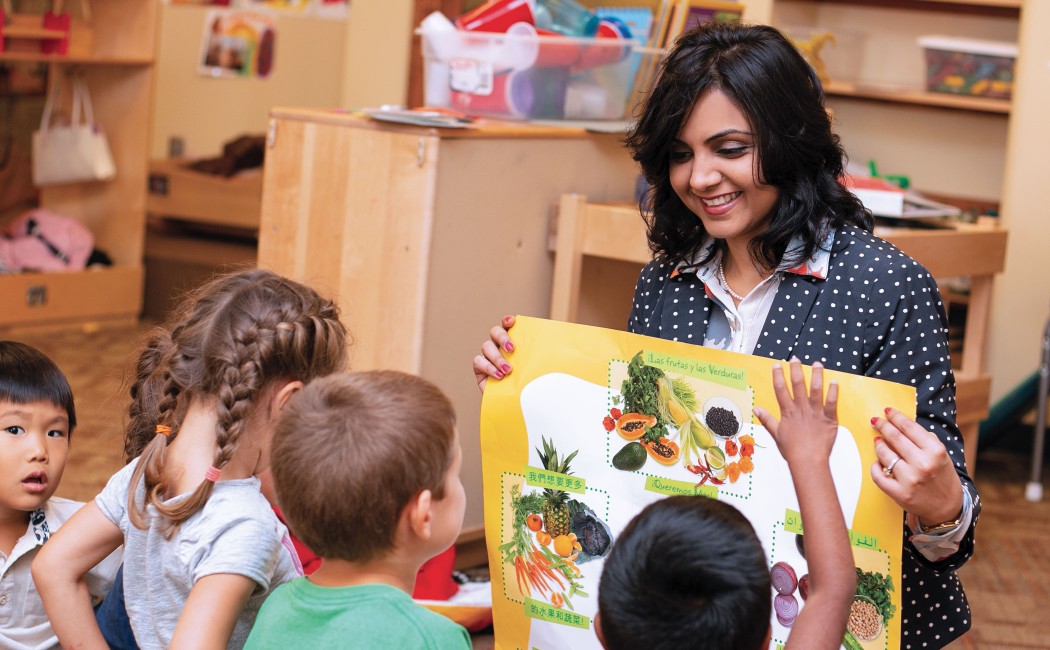
For centuries, families have served up good conversation around the dinner table.
Sharing advice, planning events and recounting the day’s highs and lows are key mealtime ingredients to connecting families and building support systems — all while cooking up valuable learning opportunities for the youngest family members.
Dipti Dev, Betti and Richard Robinson associate professor of child, youth and family studies and a Nebraska Extension child health behavior specialist, is working to help strengthen those family bonds.
Thanks to CYFS-housed funding from the Nebraska Department of Health and Human Services through a sub-award from U.S. DHHS, her research plate is full of multiple, connected projects aimed at reinforcing childhood nutrition and obesity prevention, particularly through children’s mealtime interactions with parents and child care providers.
“Family meals are a time for children and adults to connect,” Dev said. “We have good conversations and build relationships over meals by sharing our thoughts and engaging with one another. Mealtimes can be very powerful.”
She notes that family mealtimes that feature warmth, nurturing and good communication have been linked to better nutrition, improved psychosocial, literacy and academic outcomes, and fewer behavior problems.
At the core of Dev’s research is Go NAP SACC, a program designed to enhance young children’s health through better nutrition and physical activity in early care and education programs. It is the next generation of Nutrition and Physical Activity Self-Assessment for Child Care (NAP SACC), an evidence-based program designed to improve child care policies, practices and environments for obesity prevention.
Developed at the University of North Carolina, NAP SACC was introduced in Nebraska in 2008 and now has more than 30 trainers statewide.
Family meals are a time for children and adults to connect. We have good conversations and build relationships over meals by sharing our thoughts and engaging with one another. Mealtimes can be very powerful.”
Dipti Dev, associate professor of child, youth and family studies
To enhance Go NAP SACC’s effectiveness in Nebraska, Dev collaborated with Nebraska’s Go NAP SACC team to develop a user-friendly online tool that can be tailored to each individual program. The website houses data and simplifies analysis and reporting, which helps inform policymakers, researchers, extension professionals and child care practitioners to improve child care quality.
The website is the only one of its kind for any Go NAP SACC program. It enables child care providers to complete online pre- and post-intervention assessments, and generate individualized reports to help develop action plans. For example, if children’s screen time needs to be reduced, providers can work with trainers to identify best practices to achieve that goal.
In 2018, 280 Nebraska early childhood education professionals participated in Go NAP SACC at 111 homes and child care centers, impacting about 4,000 children.

According to provider assessments, participating child care programs have significantly improved a range of nutritional and screen-time habits among children, and have generated more physical activity. The program recently has focused on Nebraska counties in which obesity is prevalent.
Obesity, Dev said, has “far-reaching, negative implications,” including poor nutrition and academic outcomes, weight stigma, depression, body issues and bullying. It also is associated diabetes, cardiovascular disease and other health issues, which generate significant financial consequences.
Dev’s healthy eating program — Ecological Approach To Family Style Dining (EAT-Family Style) — focuses on fostering pleasant mealtime environments and family engagement. Participating child care providers eat meals with the children, who select and serve their own portions. Research suggests that practices such as role-modeling, sensory exploration and supporting children’s self-regulation encourages children to try new foods and learn healthy habits.
“When adults sit with their kids and talk about how crunchy and delicious broccoli is, for example, the kids will be curious and willing to try it,” Dev said.
Children who participated in the EAT-Family Style pilot ate more fruits, vegetables and healthy grains. Teachers reported that children were more engaged during meals, and have expanded their vocabularies through mealtime conversations.
“They are learning new words and eating healthier while enjoying mealtimes together,” Dev said.
Technology is integral to EAT-Family Style reaching rural providers, whose curriculum includes online training modules with about 70 short videos, goal-setting and distance coaching. Participating teachers and child care providers receive Chromebooks to complete modules and surveys, and to video conference with their coaches, who are Extension educators.
I have always been intrigued with the positive power of family mealtimes.”
Dipti Dev, associate professor of child, youth and family studies
Dev is also working with the College of Engineering, the Jeffrey S. Raikes School of Computer Science and Management, and Stanford University to develop the NU-SensiTray, which measures a child’s food intake and calculates nutritional values of food they consume. The data is then relayed to a website and smartphone application for use by researchers and parents.
Based on the nutritional intake of their child, parents also receive targeted research-based messages to foster healthy eating.
A working SensiTray prototype — based on the U.S. Department of Agriculture’s MyPlate recommended food groups — was created using 3D printing technology, sensors and software tools.
“I have always been intrigued with the positive power of family mealtimes,” Dev said. “Integrating this technology to help parents and providers make informed decisions can make the wisdom and support shared at the dinner table even more powerful.”
